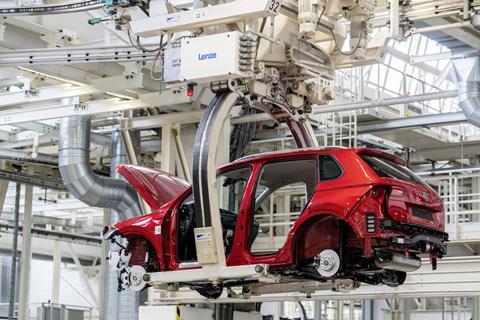Volkswagen is planning to close at least three plants in Germany, make further staff redundancies and cut pay by 10% across its workforce, according to the head of VW’s works council, Daniela Cavallo. It is the first time in the company’s 87-year history that it has considered shutting down plants in its German industrial heartland.

Earlier this week Cavallo told hundreds of employees gathered at VW headquarters in Wolfsburg that all German VW plants would be affected by the plans. It is not yet clear which plants will be closed or how many of the 300,000 staff in Germany will be affected.
Volkswagen AG said it is looking to restructure across VW Passenger Cars, Volkswagen Group Components and Volkswagen Commercial Vehicles to get substantial cost reductions and maintain competitiveness. Its CEO Thomas Schäfer said that factory costs are currently 25% to 50% higher than planned making German plants twice as expensive as its competitors.
At its Q3 earnings call VW Group’s chief financial and operations officer, Arno Antlitz, said the VW brand was not earning enough to invest in its future and China operations were not making up for the deficit. Antlitz said that overcapacity in the market meant supply is high while demand has declined and prices are under pressure. He added that light commercial vehicles made a loss in the third quarter and the costs of running the VW Group Components division was not competitive.
“Key performance indicators such as overheads or factory costs in the German plants continue to deteriorate, both in absolute terms and compared to the competition,” said Antlitz.
While the Wolfsburg plant has cut factory costs compared to last year, its performance was “overall, not nearly enough”. Antlitz said any delay to intensify its efforts to remain competitive would be irresponsible. He said the carmaker only had one option: “to reduce costs and increase productivity, especially in the German plants”.
Financing the future
Employee negotiations include reduction of over-capacity through plant closures in Germany and a second round of collective wage negotiations.
“I am aware that the cuts being considered at Volkswagen AG are severe and that many employees are worried about their future,” said Antlitz. “We are facing some difficult and painful decisions. But it is our joint responsibility to lead Volkswagen into a positive and secure future. We owe it to future generations.”
In negotiations with the IG Metall union in Lower Saxony and Saxony-Anhalt VW said it could not meet demands to reinstate collective agreements that are being terminated or meet the demand for a 7% pay increase. Rather, VW is looking at a 10% pay cut to remain competitive. It is also looking to cancel the annual bonus and the collectively agreed allowance of €170 per month for trainees. It is also looking to cut trainee numbers in line with “actual needs”.
“The current development of the automotive industry in Europe and especially in Germany as a business location is causing us concern,” said Volkswagen’s chief negotiator, Arne Meiswinkel. “The declining business development of the Volkswagen brand in particular, with a margin of just 2.1%, makes this particularly clear. If we stay at this level, we will not be able to finance our future. Against this background, we cannot meet IG Metall’s demand for the reinstatement of the terminated collective agreements.”
Impact of discounts
According to Ultima Media’s business analyst Daniel Harrison the cost-cutting measures being sought by VW are not entirely unexpected. In 2023, VW agreed with its works council a €10 billion ($11.5 billion) cost-reduction programme, including a 20% reduction in ‘administrative personnel costs.’
However, in response to industry price wars and tougher competition, VW reduced its prices significantly. These price cuts, claimed Daniela Cavallo, have cost VW hundreds of millions of euros in profits. In combination with restructuring expenses, these discounts have undermined VW’s efforts to reduce costs. As a result, Volkswagen’s automotive cash flow, a key metric, turned negative in the first half of 2024 to minus €100m ($115m), compared with a positive €2.5 billion ($2.9 billion) in the first half of 2023.
Unsurprisingly in that context, head of the brand group core Thomas Schäfer has reportedly admitted that cost-saving plans have not met expectations.
Harrison outlines several problems facing the wider VW Group, including a shortfall in demand for its vehicles in Europe of around 500,000 vehicles and plummeting sales in China, with an almost halving of profits in its biggest market over the last decade to €2.6 billion ($3 billion) in 2023. VW previously generated as much as 40% of sales and 50% of profits from its Chinese vehicle sales. Harrison also pointed to a lack of competitiveness against cheaper electric vehicles (EVs) from Chinese carmakers with much lower labour costs. While VW has invested heavily in EVs for the mid and premium segments it has been slow to develop an affordable mass-market EV, which is expected in the next two years. Chinese OEMs have been quicker to market and able to export its excess production to Europe, despite import tariffs which come into force this week.
Additionally, he said that European energy, regulatory, logistics and land costs are all correspondingly higher. Germany, in particular, is suffering from high energy costs, which are among the highest in Europe and have also become a major challenge for the country’s chemicals and steel sectors.
Harrison said that Volkswagen’s move to reconsider its job security scheme and explore plant closures may set a precedent for other OEMs across Europe and beyond. As the industry grapples with the same pressures, companies may be forced to radically restructure, merge, or seek alliances and partnerships to reduce costs and mitigate the risk of failure.
“The transition to electrification was always going to be challenging, but compounding economic factors, coupled with the rise of cheaper Chinese EVs, have escalated the situation into an existential crisis for VW,” said Harrison.






































2 Readers' comments